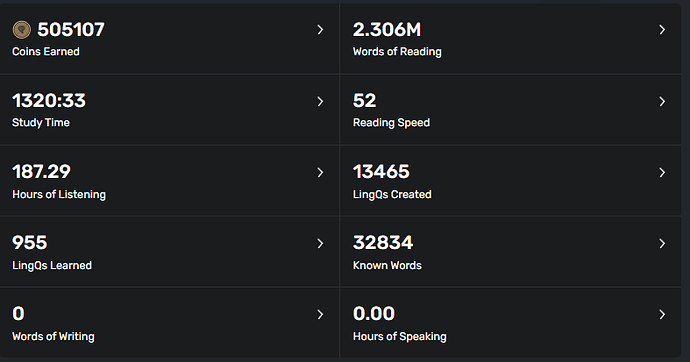 Why so offended.
Why so offended.
@nfera Of course, as pointed out, I don’t say don’t listen at all. I think there is some misunderstanding here. The statement I was mainly referring to was that listening is the most important part in language learning. I don’t think this is the case throughout the whole process.
In the beginning I am not sure how much one can really gain from listening besides familiarizing with the phonetics of the language, which is important, of course. But I think that listening is something that becomes more worthwhile once you have reached a certain level in the language and that in the beginning there are other means were ones time is invested better.
I listen to a fair amount of japanese music. And yes, meanwhile I became pretty good at recognizing the syllables. But I don’t know whether those syllables are the beginning or the end of a word, or something in between. I can’t even say for sure where I am in the sentence. But if it is a word that I know (there aren’t many, though), I recognize it.
And that’s how I understood the content of the discussion. Beeing able to actually hear words, not just syllables without any meaning. And yes, if you want to be able to understand a certain dialect for example listening to it a lot is important. But that is probably not the main goal for a beginner, or am I wrong?
Here I’d oppose. I would say that it is easier if the language uses its own alphabet.
The problem is that if the target language uses an alphabet you already know, that is maybe even used by your native language, like the latin alphabet for most of us, you already have sounds strongly tied to the individual letters and syllables. I mean, almost all Germans are exposed to a great amount of English. Nevertheless it is hard to find german politicians for example that don’t have a strong accent, even if they speak the language at a decent level. When I speak English, I get easely recognized as German, and Germans can even tell which federal state I am from  I would assume this to be the case for many other people, too, not just Germans. It would be interesting to see whether the effect is similarly strong if people speak a language that uses a different writing system or alphabet.
I would assume this to be the case for many other people, too, not just Germans. It would be interesting to see whether the effect is similarly strong if people speak a language that uses a different writing system or alphabet.
EDIT: It seems that studies suggest the exact opposite. It seems to be that learners of a foreign language have less of an accent if the language uses an alphabet their are already familiar with. That is surprising. Other studies however suggest, that using the IPA when teaching English for example improves pronounciation a lot. (There is a strong correlation between listening comprehension and accent)
However, most studies seem to use very low sets of people (usually between 10-50), so I would take that with a grain of salt.
